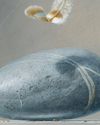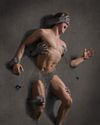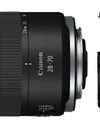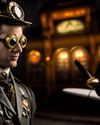
AFTER
BEFORE
THE MISSION
Achieve four distinct portrait lighting looks with new LED setups
Time needed One hour
Skill level Intermediate
Kit needed
• Portrait lens
• LED lights
PERFECT CATCHLIGHTS
Ask your model to turn their head until you're getting the perfect catchlights in their eyes, as this will elevate your portraits. We tended to use the AEOS 2 to light the background of our scenes and then the smaller NEO 3 to add a little 'fill' light to the face which also creates the catchlights.
QUICK TIP!
Bring attention to your subject with a wide aperture, such as f/1.8, for a shallow depth of field to blur the background
This month we were invited by Rotolight to try out their new AEOS 2 and NEO 3 LED lights at the stunning Knowle Hall with a mixture of models and lighting setups, hosted by The Creativity Hub.
Flash is the conventional light source of choice for portraiture, so we were eager to see how these two LED lighting options from Rotolight performed. The AEOS 2 and NEO 3 lights were certainly powerful and we were able to create some fantastic portraits. As they're constant lights you can see how your lighting is working in real time, a bit like a modelling lamp on a flash head. They also feature built-in colour gel options, meaning you don't have to carry around plastic gels which would also reduce light output on a flash.
Constant lights are also ideal for video, making them versatile accessories. See for yourself how we got on and why not try out some of our tips and lighting setups on your own portraits.
SET UP TO PHOTOGRAPH WITH LED PANELS
This story is from the June 2022 edition of PhotoPlus : The Canon Magazine.
Start your 7-day Magzter GOLD free trial to access thousands of curated premium stories, and 9,000+ magazines and newspapers.
Already a subscriber ? Sign In
This story is from the June 2022 edition of PhotoPlus : The Canon Magazine.
Start your 7-day Magzter GOLD free trial to access thousands of curated premium stories, and 9,000+ magazines and newspapers.
Already a subscriber? Sign In

The Art of Copying Art - James Paterson shows you how to use your Canon gear to capture artwork and paintings the right way with simple camera and lighting skills
Whether you want to capture a painting like the above, digitise old prints or reproduce any kind of canvas, there's real skill in capturing artwork with your camera. Not only do you need the colours to be accurate, you also need to master the spread, angle and quality of the light to minimise glare and show the work at its best.This painting by the artist Bryan Hanlon has a wonderfully subtle colour palette. To reproduce the painting in print and digital form, it needs to be captured in the right way.

Fright night
Canon photographer and digital artist Alexander loves to craft incredible fantasy scenes with a spooky horror twist

Sharpen your shots with DPP
Sharpening a digital image also increases contrast at the edge of details

CANON ImagePrograf PRO-1100
Deeper blacks, better bronzing, greater lifespan and 5G Wi-Fi -Canon's new printer is full of new tech, says

Canon's new 'kit lens' is actually a half-price f/2.8 trinity lens!
The Canon RF 28-70mm F2.8 IS STM lacks a red ring, but borrows premium features from its L-series siblings

DREW GIBSON
Pro motorsports photographer Drew on why he hasn't (yet) switched to Canon's mirrorless system, why old-school techniques can be the most reliable, and the lessons learned from more than a decade shooting the world's biggest car brands

Up in smoke
Make a smoky shape in Affinity Photo and get to grips with the amazing Liquify Persona under the guidance of James Paterson

Expand your creativity with Generative Fill
Photoshop's Al-powered feature brings revolutionary new tools to image editing. James Paterson reveals all...

Turn your images into vintage postcards
Wish you were here? Sean McCormack explains how you can give your summer photographs a vintage postcard look

The Angel Malibu
Light painting an American movie producer in the Wadi Rum Desert in Jordan was a highly unlikely evening out for David!